Friday Night Lights (PG-13)
View Tralier and Clips
A Review
By M. Chad Durham

How often does a small-town writer get to sit down and write a review about a film detailing events that actually took place in his hometown? My house is just blocks away from Odessa Permian High School with Ratliff Stadium looming on the horizon just up the road. In my living room I notice my wife’s decorative train with individual cars that spell out the word: M-O-J-O, a constant reminder that I married a Permian grad.
The wife and I watched Friday Night Lights in one of four jam-packed theatres here in Odessa. Sitting right behind us were some boys that had acted as football players in the film. When the credits rolled at the end the entire audience erupted in applause; but truth be told, this town hasn’t always felt this good about the exposure Friday Night Lights has brought to the community.
 A mutual friend introduced me to Coach Gary Gaines one summer at a church youth gathering. Gaines was the head football coach in Monahans at the time and I was just a junior-varsity quarterback from rival Fort Stockton. Gaines looked down at me and said, “So you’re Durham. I hear we’re gonna have our hands full with you next year.” While I’m sure Gaines has long since forgotten me, and our brief meeting, I never did because it had such lasting effect. Gaines offered me more positive encouragement in our subsequent five-minute conversation than the entire coaching staff at Fort Stockton did in all of 1985. I had to wait for another year and a whole new set of coaches before I got my chance to give Monahans a real handful in 1986 but by the time I did, Gaines had already moved on to bigger and better things at Odessa Permian. Success at Permian is judged in terms of State Championships, not playoff appearances. During Gaines inaugural season Permian missed the playoffs altogether and in 1987 they were knocked out in the state semi-finals by Plano.
A mutual friend introduced me to Coach Gary Gaines one summer at a church youth gathering. Gaines was the head football coach in Monahans at the time and I was just a junior-varsity quarterback from rival Fort Stockton. Gaines looked down at me and said, “So you’re Durham. I hear we’re gonna have our hands full with you next year.” While I’m sure Gaines has long since forgotten me, and our brief meeting, I never did because it had such lasting effect. Gaines offered me more positive encouragement in our subsequent five-minute conversation than the entire coaching staff at Fort Stockton did in all of 1985. I had to wait for another year and a whole new set of coaches before I got my chance to give Monahans a real handful in 1986 but by the time I did, Gaines had already moved on to bigger and better things at Odessa Permian. Success at Permian is judged in terms of State Championships, not playoff appearances. During Gaines inaugural season Permian missed the playoffs altogether and in 1987 they were knocked out in the state semi-finals by Plano.
 Things weren’t so great in West Texas back in those days. The oil bust sent everybody reeling in 1986. I had a job with an oil company that summer, which was more than I could say for the thirty or so men I passed each and every morning sitting in the yard hoping for even a few hours work. Little did they know that my task was to compile an inventory of corporate assets so the owner could turn around and sell-off his company piece by piece.
Things weren’t so great in West Texas back in those days. The oil bust sent everybody reeling in 1986. I had a job with an oil company that summer, which was more than I could say for the thirty or so men I passed each and every morning sitting in the yard hoping for even a few hours work. Little did they know that my task was to compile an inventory of corporate assets so the owner could turn around and sell-off his company piece by piece.
Just four years earlier U.S. federal courts put an end to segregation in Odessa by ordering the closure of Ector High School in 1982. Ector was the last all-black high school in the entire country. Naturally, when H.G. “Buzz” Bissinger showed up in Odessa in 1988 to write a book about that mystical (mythical?) thing called Mojo football, he had an abundance of off-field material. This town was steeped in racism; half the town had gone broke in the oil bust, and while Permian High School was still used to winning football games back then, they hadn’t won a state championship since 1984. Bissinger’s book really exposed the fundamental nature of our fair city. Consequently, once it hit the stands, Bissinger instantly became the most hated man in the history of Odessa. But the real story, the story covered by the motion picture Friday Night Lights, was all about the players.
 And their coach; Gaines is now the head football coach at Abilene Christian University. He’s never been particularly fond of the attention Friday Night Lights brought his way. In fact, he’s on record saying he’s never even read the book and that he hasn’t spoken to Bissinger since the book was published.
And their coach; Gaines is now the head football coach at Abilene Christian University. He’s never been particularly fond of the attention Friday Night Lights brought his way. In fact, he’s on record saying he’s never even read the book and that he hasn’t spoken to Bissinger since the book was published.
I’ve read the novel cover-to-cover more than once. I always thought that while the book exposed the Odessa community and Permian football for what it really was at the time, it still managed to paint Gaines in a favorable light. The film does so even more. Gaines doesn’t utter a single curse word in the movie, which clearly depicts him as a devoted family man of character who genuinely cares for the kids he coaches. He tries to instill confidence in his team but struggles to find confidence himself in the face of overwhelming pressure to win. It was important to me both as a film critic and a Christian that the filmmakers got his character right because that’s precisely how Gaines came across to me in real life—a good Christian man who genuinely cares about others and Billy Bob Thornton renders a splendid performance as Gaines, possibly the best of his noteworthy career.

He’s not the only one. Director Peter Berg has put together some of the finest young actors in the business with each one raising the bar.
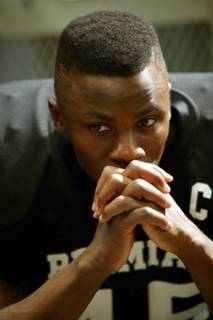 Derek Luke (Antwone Fisher) portrays Boobie Miles, the superstar running back who was injured during the course of the 1988 season. Luke swaggers and struts his way through the first half of the film. Later, he turns it around smoothly to show Boobie’s anger and anguish when faced with the reality that he will never be able to recover enough to perform at his former level.
Derek Luke (Antwone Fisher) portrays Boobie Miles, the superstar running back who was injured during the course of the 1988 season. Luke swaggers and struts his way through the first half of the film. Later, he turns it around smoothly to show Boobie’s anger and anguish when faced with the reality that he will never be able to recover enough to perform at his former level.
 Lucas Black (Sling Blade) plays the brooding Mike Winchell, heavily burdened by the weight of a sick mother and a community that asks the 17 year-old to be their leader on the gridiron every Friday night as the quarterback.
Lucas Black (Sling Blade) plays the brooding Mike Winchell, heavily burdened by the weight of a sick mother and a community that asks the 17 year-old to be their leader on the gridiron every Friday night as the quarterback.
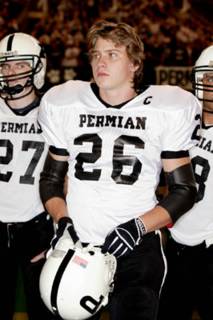 Garrett Hedlund (Troy) tackles the most difficult roll of all as Don Billingsley, the blocking-back who was sent by his mother in Oklahoma to live with his alcoholic father in Odessa just so he could play Mojo football. In each case, these young performers exceed expectations as do the remainder of the cast: Connie Britton (The Brothers McMullen, Spin City) as the coach’s wife, Jay Hernandez (The Rookie) as Brian Chavez, and relative newcomers Lee Jackson and Lee Thompson Young as Ivory Christian and Chris Comer, respectively.
Garrett Hedlund (Troy) tackles the most difficult roll of all as Don Billingsley, the blocking-back who was sent by his mother in Oklahoma to live with his alcoholic father in Odessa just so he could play Mojo football. In each case, these young performers exceed expectations as do the remainder of the cast: Connie Britton (The Brothers McMullen, Spin City) as the coach’s wife, Jay Hernandez (The Rookie) as Brian Chavez, and relative newcomers Lee Jackson and Lee Thompson Young as Ivory Christian and Chris Comer, respectively.
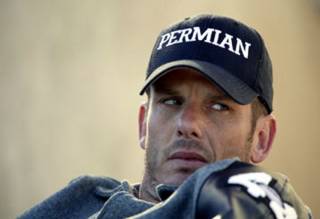 So does Berg. He utilizes a documentary approach layered by a somber, surreal soundtrack. Methodical pacing, radical jump cuts, and rapid camera moves inundate the film. Much is shot handheld. The off-field scenes are heavily filtered lending a dreamlike quality to these sequences. I found this effective because when I think back on my own football days those memories do seem to have an otherworldly quality. Berg relies heavily on the old filmmaking adage—show, don’t tell. Several scenes seem to say it all without even a single line of dialogue. The result is a dark, ominous, and gritty approach to the game and players. It is truly nothing we’ve ever seen before in the sports genre.
So does Berg. He utilizes a documentary approach layered by a somber, surreal soundtrack. Methodical pacing, radical jump cuts, and rapid camera moves inundate the film. Much is shot handheld. The off-field scenes are heavily filtered lending a dreamlike quality to these sequences. I found this effective because when I think back on my own football days those memories do seem to have an otherworldly quality. Berg relies heavily on the old filmmaking adage—show, don’t tell. Several scenes seem to say it all without even a single line of dialogue. The result is a dark, ominous, and gritty approach to the game and players. It is truly nothing we’ve ever seen before in the sports genre.
Friday Night Lights is not a story that lends itself to entertainment. Face it! There’s nothing much entertaining about watching these young men struggle to overcome adversity both on and off the field while pushing themselves further into the playoffs. Inspiring perhaps, but far from entertaining. Berg isn’t afraid to fictionalize things when needed for dramatic purposes—Permian met Dallas Carter in the semi-finals, not the state finals—but Carter did go on to win the State Title the next week. Of course, they were stripped of it later for having used an ineligible player. It also wasn’t a high-scoring affair. Even so, such fictionalizations do little to make the movie more enjoyable to watch. In fact, most of it is downright painful to watch. As Mike Winchell told a local news reporter last week, “Watching some of the family stuff was really hard.” I imagine he understated it somewhat because it all comes across so real. It must’ve been heart breaking for these young men to watch it all unfold once more on the big screen because even the most detached movie-goer will find themselves squirming in their seat at various points in the film.
 While a few things were exaggerated in the course of the flick they aren’t necessarily the things you might think. Gaines really did come home to a yard filled with “For Sale” signs, Ratliff Stadium is routinely filled to its 20,000-seat capacity, Billingsley’s dad (Tim McGraw in a surprising turn) really was that crazy, the Dallas Carter football team was that big and that fast, and they really did have a coin-flip televised live from a then-undisclosed truck stop that determined which two teams would advance to the playoffs after the regular season ended in a three-way tie.
While a few things were exaggerated in the course of the flick they aren’t necessarily the things you might think. Gaines really did come home to a yard filled with “For Sale” signs, Ratliff Stadium is routinely filled to its 20,000-seat capacity, Billingsley’s dad (Tim McGraw in a surprising turn) really was that crazy, the Dallas Carter football team was that big and that fast, and they really did have a coin-flip televised live from a then-undisclosed truck stop that determined which two teams would advance to the playoffs after the regular season ended in a three-way tie.
 Some things you just can’t make up. Fact is stranger than fiction in West Texas, especially back in those days, and that’s why the facts all too frequently sound fictitious. Berg even manages to address the more taxing issue of racism without laying it on the kids or the coaching staff. Odessa isn’t the bastion of racism it once was but the revolving door on the Permian coaches office is a true sign that the win-at-all-costs mentality still exists here even though Permian hasn’t even made the playoffs since 1998. So adequately was this echoed by the film you really don’t want the kids to win because you want Permian to lose. That’s pretty much how everybody besides Permian fans feel about it to this day.
Some things you just can’t make up. Fact is stranger than fiction in West Texas, especially back in those days, and that’s why the facts all too frequently sound fictitious. Berg even manages to address the more taxing issue of racism without laying it on the kids or the coaching staff. Odessa isn’t the bastion of racism it once was but the revolving door on the Permian coaches office is a true sign that the win-at-all-costs mentality still exists here even though Permian hasn’t even made the playoffs since 1998. So adequately was this echoed by the film you really don’t want the kids to win because you want Permian to lose. That’s pretty much how everybody besides Permian fans feel about it to this day.
 True to the actual participants, true to the story, and true to real life, don’t expect miracles. Feel-good movie fans will hate this film because there’s nothing to feel good about. There’s very little humor because there’s just nothing much humorous about what these kids (and their coach) went through. The Mighty Ducks and Varsity Blues it ain’t and the movie is the better for it.
True to the actual participants, true to the story, and true to real life, don’t expect miracles. Feel-good movie fans will hate this film because there’s nothing to feel good about. There’s very little humor because there’s just nothing much humorous about what these kids (and their coach) went through. The Mighty Ducks and Varsity Blues it ain’t and the movie is the better for it.
Friday Night Lights is hands-down the best football film ever made. Of course, that’s not saying much when the competition consists of The Longest Yard, Any Given Sunday, North Dallas Forty, The Program, and Varsity Blues. It seems like every attempt at capturing the game on film has failed miserably whether professional, college, or high school. To date, the only football movie of any merit is All the Right Moves. Writing a great novel about football? It’s been done many times over, but translating that novel to film? Just ask Peter Gent about his woes in getting North Dallas Forty on the big screen. All the more reason to give Peter Berg the recognition he so deserves for pulling it off.
This film is a HOT DATE all the way. It’s so good I’m shelving my notion of penning a football screenplay indefinitely. Nobody has ever captured football action like this on film and somewhere along the way Berg has managed to grab hold of the very essence that is West Texas football, which is by no means a tangible thing. This story is so realistic it brings back personal nightmares. Friday Night Lights is genuine, gut wrenching, and most of all, heart-felt.
For more information about Friday Night Lights visit this previous post.
This copyrighted article was also published in Grace-Centered Magazine - A daily publication for Christians that examines tradition and aspects of living the Christian life.











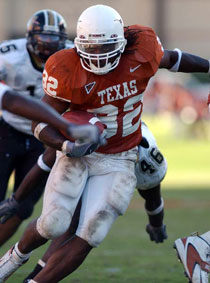


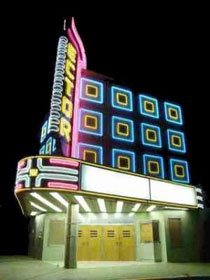

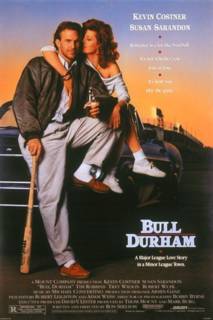
1 Comments:
A
Post a Comment
<< Home